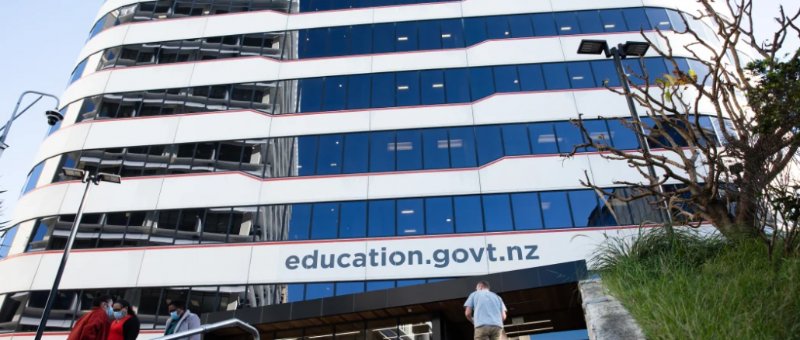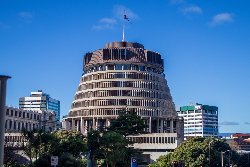Parliament: Questions and Answers - October 18
ORAL QUESTIONS
QUESTIONS TO MINISTERS
Question No. 1—Finance
1. Hon AMY ADAMS (National—Selwyn) to the Minister of Finance: Is it a goal of this Government's economic policy to make it easier for New Zealand families to get ahead?
Hon Dr DAVID CLARK (Acting Minister of Finance): Yes. This Government believes we all win when we grow our economy for the benefit of all New Zealanders.
Hon Amy Adams: Is it a sign that New Zealand families are finding it easier to get ahead that there are now 9,000 more people on job seeker benefits and 20,000 more seeking food hardship grants than there were this time last year?
Hon Dr DAVID CLARK: I'm informed—advised—that that's the same rate as it was last year.
Hon Amy Adams: Well, will the Government commit to cancelling its further planned petrol tax increases should the price of petrol reach $2.80 a litre, as some are predicting, to help ease the cost of living burden on New Zealanders?
Hon Dr DAVID CLARK: The New Zealand fuel excise is actually one of the lowest in the OECD, while the pre-tax cost of fuel is actually the highest. I'd point out that the price of Brent crude has almost doubled since the middle of last year and petrol companies have increased their profit margins by 10 percent in the last year alone. This Government is committed to looking after those who are struggling, including young families, and if you look at our Families Package, it puts $5.5 billion towards those who are struggling, including 384,000 New Zealand families who will be $75 a week better off when that policy is fully rolled out.
Hon Amy Adams: Is he aware that if petrol prices increase by another 30c a litre, the Government will be collecting just as much extra revenue from the GST alone as it would from its next petrol tax hike; and if so, why is the Government going to be double-dipping from New Zealanders' pockets?
Hon Dr DAVID CLARK: If that member no longer believes in petrol excise then she needs to tell New Zealanders which transport projects she is going to cut.
Hon Amy Adams: I raise a point of order, Mr Speaker. Well, the Minister's asked me a question and I seek leave to answer it.
SPEAKER: Well, the member seeks leave. Ministers are not meant to ask questions of the Opposition and the member seeks leave to answer it. Is there any objection? The Hon Amy Adams.
Hon Amy Adams: Thank you, Mr Speaker. Well, I can tell the House that a re-elected National Government certainly would not be putting up the tax on petrol in New Zealand—
Rt Hon Winston Peters: I raise a point of order, Mr Speaker.
SPEAKER: A point of order—[Interruption] Order! Order! A point of order, the Rt Hon Winston Peters.
Rt Hon Winston Peters: The member was granted leave to tell us which projects the National Party would cut. She is not addressing that. That's the only reason she got leave, so could she now address the issue: which projects is she going to cut? [Interruption]
SPEAKER: Order! The member will do that, she will do it now, and she will not do it in a disorderly way.
Hon Amy Adams: A re-elected National Government would not be funding a trolley bus up Dominion Road from petrol taxes on road users, and it would not be putting up the cost of petrol at a time—
SPEAKER: Order! Order!
Hon Chris Hipkins: Point of order.
SPEAKER: No, no—I'm going to deal with the member first. The member made a comment which was not a response to the question. She will stand, withdraw, and apologise.
Hon Amy Adams: I withdraw and apologise.
SPEAKER: There will be no further supplementaries.
• Question No. 2—Housing and Urban Development
2. Hon JUDITH COLLINS (National—Papakura) to the Minister of Housing and Urban Development: Is he confident that the proposals included in the reform of the Residential Tenancies Act 1986 discussion document will benefit both landlords and tenants?
Hon PHIL TWYFORD (Minister of Housing and Urban Development): Faakalofa lahi atu ki a mutolu oti. We are seeking feedback on how we strike a balance between providing tenants with security of tenure and allowing them to make their house a home while protecting the rights and interests of landlords. We need good landlords, and it's lucky for us that most landlords are good people trying to do the right thing and provide a professional service. Our policy is to set decent minimum standards for the 21st century that will professionalise the rental market and clean out the rogue operators at the bottom of the market who are undercutting good landlords and giving the whole industry a bad name.
Hon Judith Collins: Will proposals to end no-cause terminations and end fixed-term agreements make it almost impossible for a landlord to move on from a difficult tenant?
Hon PHIL TWYFORD: No, because we've made it very clear. We've heard landlords tell us that many of them rely on no-cause, 90-day terminations to get rid of rogue tenants and we've said to landlords in meetings all around the country that while we want to get rid of 90-day terminations because we don't believe in the 21st century it's justifiable for one party to be able to cancel a contract for something as important as someone's home without having to give any kind of justification, if we're going to do that, then we're going to try our best to find new ways that landlords can get rid of rogue tenants in a practical and timely way.
Hon Judith Collins: Will proposals to allow tenants to make modifications to properties mean that landlords will no longer be able to refuse a request from a tenant to modify a property?
Hon PHIL TWYFORD: Well, we haven't proposed that, but the current law that allows tenants to request the ability to make basic alterations and requires that landlords have to have a reasonable case for declining that request—we note that that doesn't appear to be working. The evidence from tenants all around the country is that they are, basically, too frightened in many cases to even request the opportunity to make simple or basic alterations. So our consultation document invites feedback from tenants and landlords about how we can make this work better so that tenants can paint a wall, put up a shelf, and make basic alterations that will allow them to make a house a home.
Kieran McAnulty: What effects will the Government's proposed changes to the Residential Tenancies Act have on families?
Hon PHIL TWYFORD: Insecure tenure can force families to continually move house. It's particularly tough on children when they have to keep changing schools. By ending no-cause terminations while ensuring that landlords can still get rid of rogue tenants and increasing the amount of notice a landlord must give tenants to terminate a tenancy, we hope to be able to provide families with a stable and secure home.
Hon Judith Collins: If, as he says, the proposal is to balance landlords' and tenants' rights, which proposals in this discussion document address any of the issues that landlords say that they are currently facing?
Hon PHIL TWYFORD: The requirement for landlords to be able to get rid of rogue tenants in a timely and workable way. Landlords tell us that the current Residential Tenancies Act does not allow them to get rid of tenants in a timely and workable way.
Hon Judith Collins: Is it the case that if these policies make it much more difficult and costly for people to rent out homes to tenants, people may simply just choose to, as he's told them to do, take their money elsewhere?
Hon PHIL TWYFORD: Well, I reject the member's premise that modern, decent, civilised tenancy laws that provide a balance between the responsibilities and obligations and rights of tenants and landlords is necessarily going to make renting a more difficult and costly thing. We don't accept that.
Kieran McAnulty: What other changes is the Government making to ensure families have warm, dry, and secure rental homes?
Hon PHIL TWYFORD: Well, we know that rental homes are more likely to be older and of poorer quality than owner-occupied homes. Approximately 2,000, or more than one-third, of rental properties have no insulation. Many are cold, damp, and mouldy, and cause respiratory illness, toxic reactions, and allergies that see more than 40,000 children bundled off to hospital every year. We do not accept that this is OK in the 21st century. The healthy homes guarantee standards, which we are now consulting on, will set minimum standards to ensure that families in this country have warm, dry homes.
• Question No. 3—Housing and Urban Development
3. JO LUXTON (Labour) to the Minister of Housing and Urban Development: What reports has he seen on the housing market?
Hon PHIL TWYFORD (Minister of Housing and Urban Development): This morning, the latest Massey University Home Affordability Report shows a 4.4 percent improvement in the national affordability over the most recent quarter, and a 2.1 percent improvement over the last 12 months. This comes on top of CoreLogic reporting that one in every four homes sold in New Zealand last month was sold to a first-home buyer, the highest rate for first-home buyers since the Clark Government in 2006-07. There is still a lot of work to do to build our way out of the national housing crisis, but we're making good progress.
Jo Luxton: How has housing affordability improved across regional New Zealand?
Hon PHIL TWYFORD: Over the past year, seven regions have shown improvements in affordability, led by Northland, with a 6.5 percent improvement. Housing affordability has also improved in Auckland and Queenstown, two of the areas with the most acute housing crisis. There's a lot more to do, but this is an early indication that this Government's policy to intervene in the housing market on the side of first-home buyers, to discourage speculators, and to build our way out of the national housing crisis is starting to bear fruit.
Jo Luxton: What did Massey University's report say about median house price-to-income ratios?
Hon PHIL TWYFORD: Well, most importantly, median house price-to-income ratios are starting to contract. House prices in Queenstown moved from 13.7 to 13.2 times annual wages, and nationally moved from 9.1 to 8.8. We are stabilising house prices and lifting household incomes through increasing wages, sensible economic management, the Government's Families Package, and increasing the minimum wage.
Jo Luxton: What reports has he seen on the effect of other policies on home affordability?
Hon PHIL TWYFORD: Recent research has found that special housing areas created to improve housing affordability actually generated a 5 percent increase in house prices and worsened the affordability of homes in that area. The researchers found that the special housing area programme simply allowed developers to offer new homes with an additional attribute, a shorter delivery time, which allowed developers to set higher prices.
• Question No. 4—Transport
4. Hon PAUL GOLDSMITH (National) to the Minister of Transport: Does he stand by all his statements?
Hon PHIL TWYFORD (Minister of Transport): Yes, in the context in which they were made.
Hon Paul Goldsmith: Does he stand by the last part of his answer to my question on Tuesday, "Does he agree that the Prime Minister's summation on 8 October that taxes and levies amounted to 6.8 cents was wrong?", namely: "As the Prime Minister also pointed out, the lion's share of the increase in petrol prices in the last year is due to the pre-tax cost, not Government revenue measures."?
Hon PHIL TWYFORD: Yes.
Hon Paul Goldsmith: Does he agree with the Prime Minister's conclusion last week: "New Zealand consumers, in my book, are being fleeced."?
Hon PHIL TWYFORD: I always agree with the Prime Minister.
Hon Paul Goldsmith: Who is doing the fleecing?
Hon PHIL TWYFORD: Just check the Prime Minister's statement—it made it pretty clear.
Hon Paul Goldsmith: So is the Prime Minister the judge and jury in any inquiry that's going to be going on into fuel pricing?
Hon PHIL TWYFORD: No.
• Question No. 5—Education
Hon NIKKI KAYE (National—Auckland Central): A question to the Minister of Education—[Interruption]
SPEAKER: In fact, you've just given them two.
5. Hon NIKKI KAYE (National—Auckland Central) to the Minister of Education: Is he confident that education expenditure has been a priority for this Government?
Hon CHRIS HIPKINS (Minister of Education): In the context of the largest increase in Vote Education in over a decade, absolutely, yes.
Hon Nikki Kaye: Will he apologise to teachers if the New Zealand Police are prioritised and offered a salary increase of more than 4.5 percent per year, well above the offer for teachers?
Hon CHRIS HIPKINS: The New Zealand Police have not been offered that.
Hon Nikki Kaye: If the New Zealand Police are offered more than 4.5 percent, which includes 3 percent plus competency/service increment (CSI), will he promise to match that for teachers?
Hon CHRIS HIPKINS: The member's not comparing apples with apples.
Hon Nikki Kaye: If the New Zealand Police have been effectively offered 4.5 percent, which includes CSI, will he promise to match that for teachers?
Hon CHRIS HIPKINS: As I indicated, the member's not comparing apples with apples. The pay structures are different.
Hon Nikki Kaye: I raise a point of order, Mr Speaker. That was a very simple yes or no question, and he didn't answer it.
SPEAKER: I think that the member got an answer to it.
Hon Nikki Kaye: Was he wrong when he told the House the financial breakdown of the offer was published on the Ministry of Education's website, given the ministry have contacted the Post Primary Teachers' Association to say that he was wrong and that the information will now be up shortly?
Hon CHRIS HIPKINS: A financial breakdown of the offer was published on the Ministry of Education website, and I had a copy of it in my hand at the time that I made the statement. The financial breakdown that the Post Primary Teachers' Association (PPTA) were looking for was different.
Hon Nikki Kaye: Is he saying the Ministry of Education were wrong in what they said to the unions—that he had not published the financial breakdown of the offer?
Hon CHRIS HIPKINS: No, the financial breakdown I was referring to published in great detail the step-by-step changes that had been offered as part of the contract negotiations.
Hon Nikki Kaye: That is not true. That is not true. He knows they—you know they've been asking for it.
Hon CHRIS HIPKINS: What the PPTA have asked for—
SPEAKER: Order! Order! Order! The member will resume his seat. Nikki Kaye will stand, withdraw, and apologise.
Hon Nikki Kaye: I withdraw and apologise.
SPEAKER: The Minister will start again.
Hon CHRIS HIPKINS: What I understand the PPTA have asked for is the individual costing of each element of the offer.
Hon Nikki Kaye: Does he accept that if he is unable to provide a larger fiscal envelope for teachers, we are likely to have rolling strikes and several thousand teachers short, given the projected teacher shortages out today?
Hon CHRIS HIPKINS: The retention rates for existing teachers are relatively high. What we do know is that we don't have enough teachers because the previous Government didn't train enough, and that is something that this Government is going to address. With regard to increases in pay, I'd point out that this Government has prioritised an increase in teacher pay, and we have made them the largest pay increase offer that they have had in over a decade. In fact, the pay offer that they have been given amounts to more than all of the settlements they reached under the previous National Government.
• Question No. 6—Social Development
6. Hon LOUISE UPSTON (National—Taupō) to the Minister for Social Development: Does she stand by all her Government's policies and actions in relation to the social development portfolio?
Hon CARMEL SEPULONI (Minister for Social Development): Fakalofa lahi atu. Yes.
Hon Louise Upston: Why are there 9,000 more people on jobseeker benefits than a year ago?
Hon CARMEL SEPULONI: That member knows that the proportion of people that are currently unemployed is exactly the same as what it was at this time last year: 9.4 percent. The actual number increase comes down to population increase in areas like Auckland and Canterbury, where there has been a significant population increase. What is incredibly heartening is that in the provinces and regions like Northland we've seen a reduction in unemployed and that goes to show this Government's focus on the regions is working.
Hon Louise Upston: Why has there been a 9.6 percent increase of people aged 18 to 24 on the jobseeker benefit?
Hon CARMEL SEPULONI: That member knows, because she would have received the benefit numbers this morning, that the actual unemployment rate overall is 9.4 percent, which is exactly the same as what it was this time last year. This Government has made no secret of the fact that we are focused on getting people into meaningful and sustainable employment. We're not satisfied with the fact that under the previous Government, within 18 months 50 percent of people were returning to benefit. Our focus is on ensuring that people get into sustainable and meaningful employment, and that means also having a focus on upskilling and training for our young people.
Hon Michael Woodhouse: I raise a point of order, Mr Speaker. That was a very long answer that did not address the question, which was about the unemployment rate increase for 18- to 24-year-olds.
SPEAKER: I know the member sort of waved in the general direction of the question right at the end, but I don't think she did address it, despite a very long answer on other things. Have another go.
Hon CARMEL SEPULONI: The actual breakdown, I don't have in front of me. However, I would like to say that that particular age group is getting a lot of attention from this side of House, particularly with our first-year free policy for fees and Mana in Mahi. This is not just, for us, about pushing people off into the next minimum wage job. It's making sure that they have sustainable, meaningful employment to go into, and we're focused on making sure that they are upskilled and trained for the job opportunities that we're creating through things like KiwiBuild.
Hon Louise Upston: How can the Minister explain that the unemployment rate is the same as a year ago and yet there are 9,000 more Kiwis on the jobseeker benefit?
Hon CARMEL SEPULONI: As I mentioned before, the actual proportion of people that are on the benefit is exactly the same—it's 9.4 percent. The increase that the member is referring to is as a result of population growth. If she wants an explanation, I can give one example, and that is that in Auckland the working age population has increased by 34,000 over the last year. The actual proportion of those unemployed is exactly the same as what it was a year ago.
Hon Louise Upston: Other than cost of living increases, how does she explain the nearly 20,000 more hardship grants for food in her Government's first year in office?
Hon CARMEL SEPULONI: I'm really glad that that member has asked that question. All of the evidence that we've been provided with shows us very clearly that the fact is that, for the nine years under that side of the House, housing was ignored, the crisis was denied, and the most common reason that people are seeking hardship assistance is because of the cost of housing. I'm really proud to be part of a Government that is finally addressing the number one concern that New Zealanders are faced with. It's long overdue, but thank goodness we're here to do it.
Hon Louise Upston: I raise a point of order, Mr Speaker. I specifically asked about hardship grants for food, and I was quite clear in my question.
SPEAKER: Well, the Minister can have another go if she wants.
Hon CARMEL SEPULONI: OK, sure. The number one reason that people are citing for needing to access hardship grants from Work and Income New Zealand is the cost of housing. Just to further elaborate on this, recently the Household Incomes Report was released, and it showed that, after housing costs, our most vulnerable families' incomes haven't changed since the 1980s. That is a desperate situation that the previous Government left New Zealand families in, and we're doing something to address it.
Hon Michael Woodhouse: In respect of the answer to an earlier supplementary question, is the Minister telling the House that "the next minimum wage job" is not good enough for those on jobseeker support?
Hon CARMEL SEPULONI: What I'm saying is this side of the House is aspirational for New Zealanders. We want to make sure that more New Zealanders are able to reach their potential. The strategy that was employed by the previous Government was obviously unsuccessful, because 50 percent of those who left benefits were back on within 18 months. We're about making sure that families are better off, and that they go into sustainable, meaningful employment.
Hon Louise Upston: Is a person receiving the jobseeker support payment better or worse placed to cope with the increased living costs from this Government's policy than a person in full-time employment?
Hon CARMEL SEPULONI: We are working with those who come for support from the Ministry of Social Development (MSD) to ensure that their long-term options are much better off than what they were under the previous Government. We're making sure that when people come to MSD for support, they are getting everything that they are eligible for, which was not happening under the previous Government.
Hon Louise Upston: I raise a point of order, Mr Speaker. It was a really clear question about a comparison between the jobseeker support payment and someone in full-time employment around cost of living increases, and the Minister seems incapable of answering a clear question.
SPEAKER: Well that's not a point of order. Any further supplementaries?
• Question No. 7—Disability Issues
7. PRIYANCA RADHAKRISHNAN (Labour) to the Minister for Disability Issues: What recent announcements has the Government made to improve the disability support system?
Hon CARMEL SEPULONI (Minister for Disability Issues): On 1 October, Minister Shaw and I announced the roll-out of the prototype for the transformed disability support system, called Mana Whaikaha, in the MidCentral District Health Board region. This new prototype focuses on what disabled people can do, not what they can't, and offers flexible options to increase well-being and health outcomes. The Government has committed $21.24 million over the next two years to fund the new system in MidCentral, which includes Palmerston North, Horowhenua, Manawatū, Ōtaki, and Tararua districts.
Priyanca Radhakrishnan: What's different about this new approach?
Hon CARMEL SEPULONI: The transformed system enables disabled people to have greater decision-making authority over their lives and supports. Mana Whaikaha is based on the Enabling Good Lives principles and approach and lessons learnt from the Enabling Good Lives demonstrations in Christchurch and Waikato, as well as the Ministry of Health's new model and international evidence. Enabling Good Lives takes a person-centred approach, supporting disabled people in families to think about what they want in their lives and what support they need to make that happen.
Priyanca Radhakrishnan: How will the Government ensure that the new system is right for people with disabilities and their whānau?
Hon CARMEL SEPULONI: In this new system, there will be a connector who will work with disabled people and their whānau to identify the supports they require to live the life they want. We're taking a try, learn, and adjust approach to this new system, so we can be responsive and innovative during the prototype and ensure the voices of disabled people continue to be at the heart of this work. Mana Whaikaha was co-designed by disabled people, whānau providers, and Government officials working together over the last 18 months. This reflects the Government's commitment to "Nothing about us without us".
• Question No. 8—Small Business
8. Hon JACQUI DEAN (National—Waitaki) to the Minister for Small Business: Has he heard from any small-business owners about any increased cost of doing business?
Hon IAIN LEES-GALLOWAY (Deputy Leader of the House) on behalf of the Minister for Small Business: On behalf of the Minister, yes.
Hon Jacqui Dean: How does he explain the ANZ Business Micro Scope survey, which shows that business confidence among small firms is now at a 10-year low?
SPEAKER: Order! Order! I think the member has to somehow relate it to the original question. Just the words "small business" are not enough.
Hon Jacqui Dean: How does he explain—in the context of the increased cost of doing business—the ANZ Business Micro Scope survey, which shows that business confidence amongst small firms is now at a 10-year low?
SPEAKER: Very marginal ministerial responsibility, but—
Hon IAIN LEES-GALLOWAY: On behalf of the Minister, looking at the headlines from the small firms confidence survey, cost of doing business is not mentioned as a headline issue in business confidence.
Hon Jacqui Dean: Which of his policies, if any, support small businesses against rising costs, when the ANZ report says that "small firms continue to see reasonable demand for their goods and services but perhaps some difficulty in passing on rising costs to consumers,"?
Hon IAIN LEES-GALLOWAY: On behalf of the Minister, the policies that will best support small businesses to protect themselves against rising costs are the policies that support growth in New Zealand, and policies such as the Provincial Growth Fund, the R & D tax credits, and the largest investment in transport infrastructure that this country has seen in decades will all contribute to small-business confidence.
Hon Jacqui Dean: So what does he say to the Wairarapa builder I met who wanted to take on an apprentice but is holding back because of the rising cost of fuel and wages?
Hon IAIN LEES-GALLOWAY: On behalf of the Minister, I would say to that person that we have the huge KiwiBuild programme, which will give them certainty of demand for their services over at least the next 10 years. I would point them towards the Mana in Mahi programme—that will support them to take on an apprentice. I would point them towards the fees-free policy—that gives not one but two years of free fees for people who take up an apprenticeship. This Government has a range of policies that respond to that person's concerns, and that is, I am sure, why they have more confidence in this Government than anything the previous Government did.
• Question No. 9—Energy and Resources
9. JONATHAN YOUNG (National—New Plymouth) to the Minister of Energy and Resources: Does she stand by all her Government's policies, statements, and actions in relation to the energy and resources portfolio?
Hon DAVID PARKER (Acting Minister of Energy and Resources): On behalf of the Minister of Energy and Resources, yes—
SPEAKER: Can I just interrupt. I think he is the Acting Minister, isn't he? Aren't you?
Hon DAVID PARKER: Yes, because she's overseas. Yes, sir. I still thought I had to say who I—
SPEAKER: No, you don't, because you are the Minister.
Hon DAVID PARKER: Well, yes—in context.
Jonathan Young: Thank you, and congratulations. Does it remain the Government's policy that there will be no new mines on conservation land, as stated in the Speech from the Throne?
Hon DAVID PARKER: I'm not sure of the detail of that. If the member is referring to stewardship lands, I think the position has been made clear in respect of fossil fuels. I'm not sure in respect of other mining on conservation lands. If the member cares to put down a specific question, I'll ensure that it's answered.
Maureen Pugh: If this is already Government policy, how can those most affected be confident that the upcoming consultation will be thorough and meaningful?
Hon DAVID PARKER: The consultation document that has been produced will be processed in the normal way.
Maureen Pugh: Is the Minister aware that banning new mines on conservation land will ban new mines on 85 percent of the land on the West Coast?
Hon DAVID PARKER: That's a hypothetical question, and therefore I won't answer it.
Jonathan Young: Is it the intention of the Government to extend new section 50A, recently introduced in the Crown Minerals (Petroleum) Amendment Bill, which bans access to Taranaki conservation land except for minimum impact activities, to the rest of the country, and if not, then why is it in the Crown Minerals (Petroleum) Amendment Bill?
Hon DAVID PARKER: I don't have the answer to that particular question, but I'm sure if it's put down in writing, it will be answered.
Rt Hon Winston Peters: Having regard to recent events, I seek the leave of the House for Maureen Pugh to put a couple more questions to demonstrate how effective she's been as an MP.
SPEAKER: Order! Order!
Maureen Pugh: Point of order, Mr Speaker.
SPEAKER: I'm going to deal with this one first, and that is that the member is an experienced member—the most experienced member in the House—and he knows that one cannot seek leave on behalf of another member when that member is present.
Maureen Pugh: I raise a point of order, Mr Speaker. I take offence at that comment from the Deputy Prime Minister, and I ask him to withdraw and apologise.
SPEAKER: Well, no, I actually think that that was not an offensive comment. I mean, one might say, given a number of the comments that have been made here recently, from both sides of the House, I think it was, if not absolutely polite, then not so bad as it would cause me to require the member to withdraw.
Hon Christopher Finlayson: And it's after lunch.
Rt Hon Winston Peters: You're gone—we all knew that.
SPEAKER: Order! The Deputy Prime Minister will stop referring to me in that way.
• Question No. 10—Trade and Export Growth
10. JAMIE STRANGE (Labour) to the Minister for Trade and Export Growth: What actions is the Government taking to enhance New Zealand's international trade relationships?
Hon DAVID PARKER (Minister for Trade and Export Growth): On my own behalf, the coalition Government is getting on with the governing, and we're working hard to grow exports, jobs, and incomes. An important part of our trade strategy is the Comprehensive and Progressive Agreement for Trans-Pacific Partnership (CPTPP), which we hope to ratify in the coming weeks now that our foreign buyer ban is in place. With the rising tide of trade protectionism, CPTPP is essential to protecting and enhancing our trade interests. I'd also like to thank the Opposition for supporting the Government to improve outcomes for our exporters by supporting that legislation. We believe CPTPP is good for New Zealand.
Jamie Strange: How is the Government representing New Zealand's trade interests internationally?
Hon DAVID PARKER: We're doing this actively around the world. I was in Singapore last weekend at negotiations for the Regional Comprehensive Economic Partnership agreement, and next week I'll be in Washington and Ottawa. I'm meeting US Trade Representative Robert Lighthizer, as well as other members of the US administration. In Ottawa, New Zealand will be presenting our options for reform and improvement of the World Trade Organization. The maintenance of a fair, rules-based international trading system is essential to protecting New Zealand's economic interests.
Jamie Strange: How is the Government rebuilding public support for trade at home?
Hon DAVID PARKER: After years of dwindling public support in New Zealand for international trade, this Government has turned that around by going out and listening to people. We undertook extensive public meetings around CPTPP, around our ban on foreign buyers of existing homes, and on forestry investment rules. We recently launched the Trade for All agenda, which provides a forum for all sectors of civil society to make recommendations to the Government on how New Zealand conducts its trade policy. We believe it is critical that New Zealand remains an open, export-focused nation, but we need to ensure that the Government has the social licence to do so.
Hon Todd McClay: Does he believe that the Pacific Alliance trade deal, launched by the previous Government last year, will enhance New Zealand's trade relations with Columbia, and if so, is he concerned that Columbia didn't turn up to the most recent negotiations hosted by his Government, held in New Zealand last month?
Hon DAVID PARKER: Yes, we were concerned by that. It was occasioned by the fact that the new Colombian Government has not yet decided whether it wishes to pursue the Pacific trade alliance. I've also seen recent comments from other South American countries that say that the Pacific Alliance is less important to them because they now have CPTTP.
• Question No. 11—Economic Development
11. Hon PAUL GOLDSMITH (National) to the Minister for Economic Development: What are the key elements of the Government's economic development strategy?
Hon DAVID PARKER (Minister for Economic Development): There are four main parts to our plan for growth: firstly, strengthening the foundations of future success by developing new points of comparative advantage; secondly, in farming and tourism sectors, we need to add more value to volume while reducing adverse impacts on the environment—we believe this will add value both via efficiency improvements and by enhancing the brand we rely upon for premium prices; thirdly, we need to leverage new opportunities, many of which are adjacent to our existing key sectors—that's important to lift productivity and exports and enable higher-value land uses as well; and, fourthly, we need to back the industries of the future, positioning New Zealand as a hub for world-leading innovation linked to global value chains. We're doing all this as we move New Zealand's economy away from its reliance on speculation and immigration.
Hon Paul Goldsmith: How does increasing the cost of doing business fit into the economic development strategy?
Hon DAVID PARKER: Well, if the member's referring to the price of oil, that's beyond our control. If the member's suggesting that we follow the Argentinian example of fixing exchange rates, well, the only thing I can say is that's a Muldoon-ian heritage that he shares with other people on that side of the House.
Hon Paul Goldsmith: Does he think increasing petrol taxes by 24c a litre of petrol in the space of just three years will increase the cost of doing business?
Hon DAVID PARKER: No, it will actually free up traffic congestion in Auckland and make our economy more efficient. It will also reduce travel times for people as they go to and from work, and it will assist in increasing productivity in a way that the prior Government was never able to achieve after nine years of pretty lacklustre economic performance.
Hon Paul Goldsmith: If investing in transport infrastructure is such a priority for economic development, why doesn't he insist that the lion's share of the $3 billion Provincial Growth Fund be devoted to priority transport infrastructure?
Hon DAVID PARKER: Because that would be a waste of money. It would fund lower-value infrastructure projects, and it would not achieve what I believe is the most important attribute of the Provincial Growth Fund, which is to bring forward new points of comparative advantage, to grow productivity, and to increase job prospects and incomes in the regions.
• Question No. 12—Revenue
12. ANDREW BAYLY (National—Hunua) to the Minister of Revenue: Does he stand by all the Government's policies and actions in relation to the revenue portfolio?
Hon Dr DAVID CLARK (Associate Minister of Finance) on behalf of the Minister of Revenue: On behalf of the Minister of Revenue, yes.
Andrew Bayly: Does the Minister believe that IRD has in place the necessary resources to collect the expected additional $2.5 billion of new taxes introduced by the Labour – New Zealand First Government, including the revenue from fuel taxes—
SPEAKER: Order! The member has finished the question.
Hon Dr DAVID CLARK: I question some of the premises in the member's question, but what I would say is that there never is 100-percent compliance with tax policy, but the IRD does a pretty good job by world standards.
Andrew Bayly: How much additional GST revenue does he expect IRD to collect from the 40c increase in the cost of petrol?
Hon Dr DAVID CLARK: It's a very specific question. If the member wishes to put it down in writing, I'm sure an answer will be provided.
Andrew Bayly: What certainty can he give to the House that overseas suppliers of goods sold online will comply with the requirements to collect GST from consumers and not be a disaster from a revenue-collection perspective, as noted by an EY tax partner earlier today?
Hon Dr DAVID CLARK: It's a useful question to ask, and I'm very happy to answer it. To minimise the risk of any supplier leaving the New Zealand market, we've designed the rules to be as simple and flexible as possible. And if we look across at Australia, my understanding is that Amazon, as a good example, is complying with the rules that have been put in place.
Andrew Bayly: What is the estimate of the cost of collecting tax revenue from a capital gains tax, as proposed by the Tax Working Group?
Hon Dr DAVID CLARK: The Tax Working Group final report will be released in February. It hasn't been released as yet, and when it is released in February, the Government will then look into it and form its priorities from there.
Tabling of Documents—Question No. 11 to Minister
Hon DAVID PARKER (Attorney-General): I should have done this at the end of my question. I seek leave to table a speech setting out the economic development vision for the Government. It is not on the web. I delivered it on 16 October, and I think the member opposite who asked the question would like to read it.
SPEAKER: I'll put that leave to the House. Can I say that, in the future, there is a relatively simple system for ensuring that is made available; it is called an envelope. The question is should the document be tabled. Is there any objection? No objection.
Document, by leave, laid on the Table of the House.


 Gordon Campbell: On The Public Sector Carnage, And Misogyny As Terrorism
Gordon Campbell: On The Public Sector Carnage, And Misogyny As Terrorism National Maori Authority: Maori Authority Warns Government On Fast Track Legislation
National Maori Authority: Maori Authority Warns Government On Fast Track Legislation NZ Government: Comprehensive Partnership The Goal For NZ And The Philippines
NZ Government: Comprehensive Partnership The Goal For NZ And The Philippines DoC: Canterbury Spotted Skink In Serious Trouble
DoC: Canterbury Spotted Skink In Serious Trouble Te Pāti Māori: Oranga Tamariki Cuts Commit Tamariki To State Abuse
Te Pāti Māori: Oranga Tamariki Cuts Commit Tamariki To State Abuse NZCTU: Inflation Data Shows Need For A Plan On Climate And Population
NZCTU: Inflation Data Shows Need For A Plan On Climate And Population Statistics New Zealand: Annual Inflation At 4.0 Percent
Statistics New Zealand: Annual Inflation At 4.0 Percent


